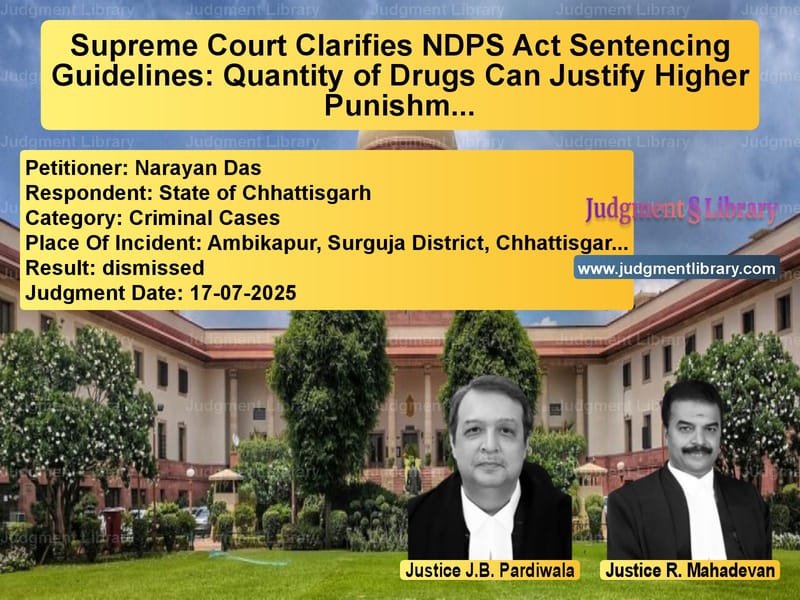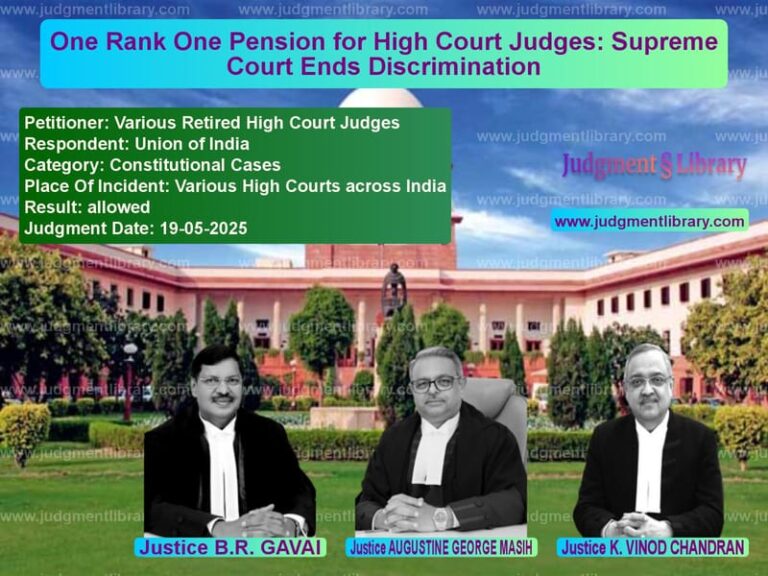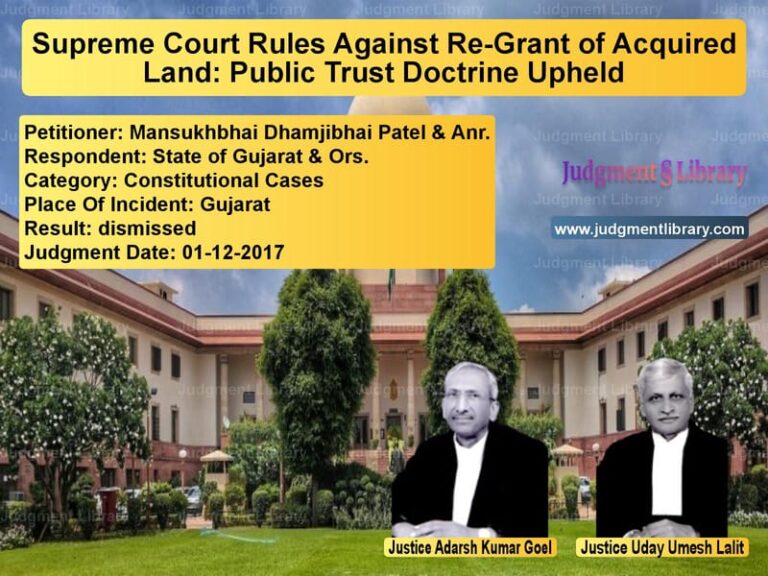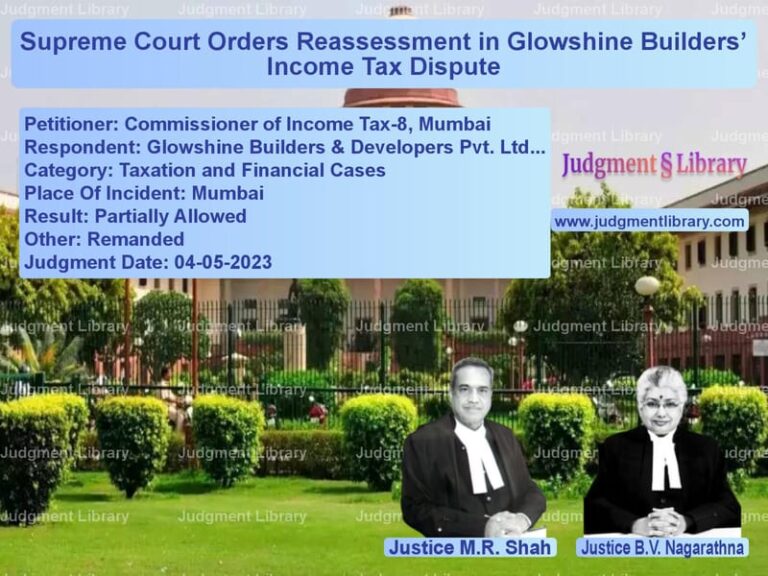Supreme Court Clarifies NDPS Act Sentencing Guidelines: Quantity of Drugs Can Justify Higher Punishment
In a significant ruling that clarifies the interpretation of sentencing provisions under the Narcotic Drugs and Psychotropic Substances Act, 1985, the Supreme Court of India recently addressed a crucial legal question regarding the imposition of punishments higher than the minimum prescribed under the stringent anti-drug law. The case involved Narayan Das, who had been convicted for possession of commercial quantities of cough syrups containing Codeine Phosphate and had his sentence reduced by the High Court based on what the Supreme Court found to be a misunderstanding of Section 32-B of the NDPS Act.
The legal journey began on September 20, 2018, when investigating officers in Ambikapur, Chhattisgarh, received information that two individuals – Ambika Vishwakarma and Narayan Das – were standing by the main road of Parsa with psychotropic substances in a bag. A search resulted in the seizure of 236 vials of various cough syrups containing Codeine Phosphate, including 143 vials of R.C. Kuff cough syrup, 70 vials of Codectus cough syrup, and 23 vials of Elderqurex cough syrup, each containing 100ml.
Following trial in the Court of Special Judge (NDPS Act), Surguja, Narayan Das was convicted under Section 21(c) of the NDPS Act and sentenced to 12 years of rigorous imprisonment with a fine of Rs. 1,00,000. The petitioner appealed to the High Court, which while dismissing the appeal and upholding the conviction, reduced the sentence from 12 years to 10 years – the minimum prescribed under the NDPS Act.
The High Court’s reduction of sentence was based on its interpretation of Section 32-B of the NDPS Act. The High Court observed that “without assigning any special reason, the learned trial Court has awarded sentence for a period of 12 years to the appellants, which is more than the minimum sentence prescribed for offence under Section 21(c) of the NDPS Act.” Relying on the Supreme Court’s decision in Rafiq Qureshi vs. Narcotic Control Bureau Eastern Zonal Unit, the High Court concluded that since no specific reasons had been assigned for awarding a sentence higher than the minimum, the reduction was warranted.
Before the Supreme Court, Mr. Ashish Pandey, the learned counsel appearing for the petitioner in this legal aid matter, raised multiple contentions challenging the seizure proceedings. However, the Supreme Court found no reason to disturb the High Court’s judgment dismissing the appeal against conviction.
The Supreme Court, comprising Justices J.B. Pardiwala and R. Mahadevan, identified a fundamental legal error in the High Court’s approach to sentencing. The Court noted that “the High Court seems to be labouring under a serious misconception of law so far as the interpretation of Section 32-B of the NDPS Act is concerned.”
Section 32-B of the NDPS Act reads: “Where a minimum term of imprisonment or amount of fine is prescribed for any offence committed under this Act, the court may, in addition to such factors as it may deem fit, take into account the following factors for imposing a punishment higher than the minimum term of imprisonment or amount of fine…” followed by factors (a) to (f) including use of violence, abuse of public office, involvement of minors, commission near educational institutions, organized criminal groups, and involvement in other illegal activities.
The Supreme Court clarified that “We are afraid the understanding of the High Court is not correct. Section 32-B provides that the court in addition to various relevant factors may also take into account the factors as prescribed in Clauses (a) to (f). Therefore, in a given case, the trial court may not find it necessary to consider the factors as prescribed in Section 32-B. Having regard to the quantity of the contraband, the nature of the narcotic or the psychotropic substance, as the case may be, the antecedents, if any, etc., may deem fit to impose punishment which can be more than the minimum.”
The Court extensively analyzed its earlier decision in Rafiq Qureshi, noting that “The seminal issue in Rafiq Qureshi (supra) revolved around the interpretation of Section 32-B of the NDPS Act. In other words, whether the absence of any factors enumerated in Section 32-B in Clauses (a) to (f) restricts the trial courts from imposing sentence higher than the minimum prescribed. This Court in Rafiq Qureshi (supra) clarified that the language of Section 32-B inherently preserves the court’s discretion to consider other relevant factors beyond those listed.”
The Supreme Court emphasized that “Specifically, the quantity of the narcotic substance was deemed a pertinent factor warranting a sentence above the statutory minimum, despite the absence of any enumerated aggravating factors in Section 32-B.”
Referring to Sakshi vs. Union of India, the Court highlighted the principle that “legislative intent is derived from the explicit language of the statute, avoiding the insertion of words not present. Since Section 32-B uses ‘may deem fit’ in addition to the enumerated factors, it does not restrict the courts to only those factors but allows broader discretion in sentencing.”
The judgment also referenced Gurdev Singh vs. State of Punjab, where it was held that “the court should be guided by the factors mentioned in Section 32-B of the NDPS Act and other relevant factors while imposing a sentence higher than the minimum. Therefore, factors mentioned in Section 32-B of the NDPS Act are in addition to other relevant facts, and it cannot be said that the minimum sentence under the NDPS Act is to be considered as a maximum sentence.”
The Supreme Court made a crucial observation about the High Court’s approach: “It appears that the understanding of the High Court so far as Section 32-B of the NDPS is concerned is that the minimum sentence should be considered as maximum sentence. That is not the correct understanding of Section 32-B of the NDPS Act.”
Despite this clear legal clarification, the Supreme Court exercised restraint and did not interfere with the sentence reduction in this particular case, stating “We do not want to interfere with that part of the order of the High Court reducing the sentence.” The petition was ultimately dismissed, upholding both the conviction and the reduced sentence.
This judgment serves as an important clarification of sentencing principles under the NDPS Act. It establishes that trial courts retain broad discretion in imposing sentences between the minimum and maximum prescribed ranges, and that factors beyond those specifically enumerated in Section 32-B – particularly the quantity of contraband – can validly justify sentences higher than the statutory minimum. The ruling reinforces that the minimum sentence should not be treated as the default or maximum punishment, but rather as the baseline from which courts can exercise their sentencing discretion based on all relevant circumstances of each case.
The Supreme Court’s decision provides much-needed clarity to trial courts across the country, ensuring consistent application of sentencing principles in NDPS cases while maintaining the legislative intent of imposing deterrent punishments for drug trafficking offenses. By correcting the High Court’s misinterpretation of Section 32-B, the judgment preserves the sentencing court’s ability to consider the totality of circumstances, including the scale of drug trafficking operations as indicated by the quantity of contraband involved.
Petitioner Name: Narayan Das.Respondent Name: State of Chhattisgarh.Judgment By: Justice J.B. Pardiwala, Justice R. Mahadevan.Place Of Incident: Ambikapur, Surguja District, Chhattisgarh.Judgment Date: 17-07-2025.Result: dismissed.
Don’t miss out on the full details! Download the complete judgment in PDF format below and gain valuable insights instantly!
Download Judgment: narayan-das-vs-state-of-chhattisgar-supreme-court-of-india-judgment-dated-17-07-2025.pdf
Directly Download Judgment: Directly download this Judgment
See all petitions in Drug Possession Cases
See all petitions in Judgment by J.B. Pardiwala
See all petitions in Judgment by R. Mahadevan
See all petitions in dismissed
See all petitions in supreme court of India judgments July 2025
See all petitions in 2025 judgments
See all posts in Criminal Cases Category
See all allowed petitions in Criminal Cases Category
See all Dismissed petitions in Criminal Cases Category
See all partially allowed petitions in Criminal Cases Category







